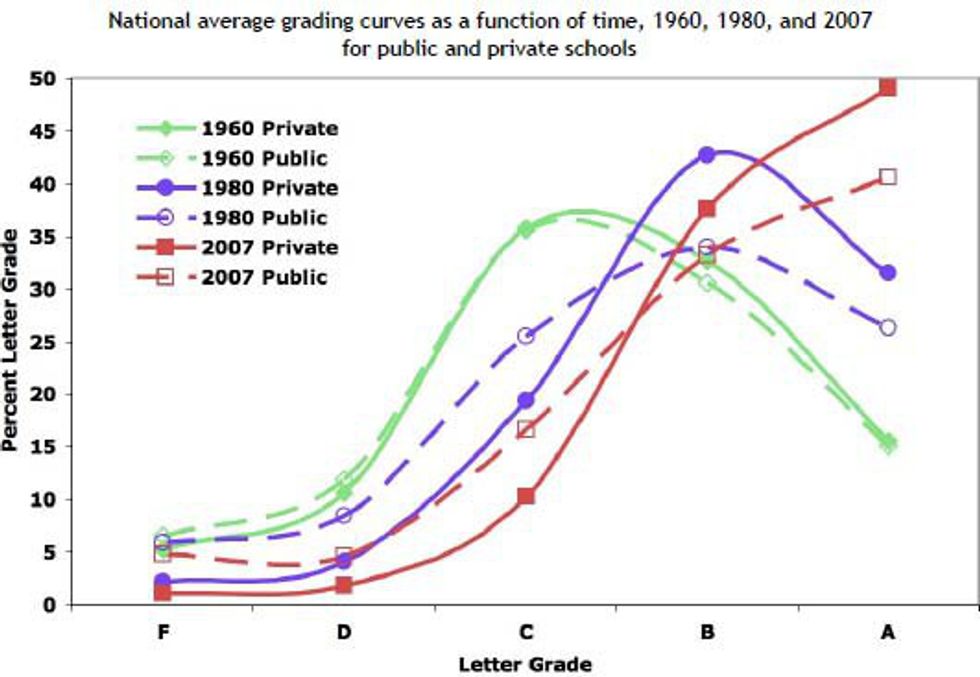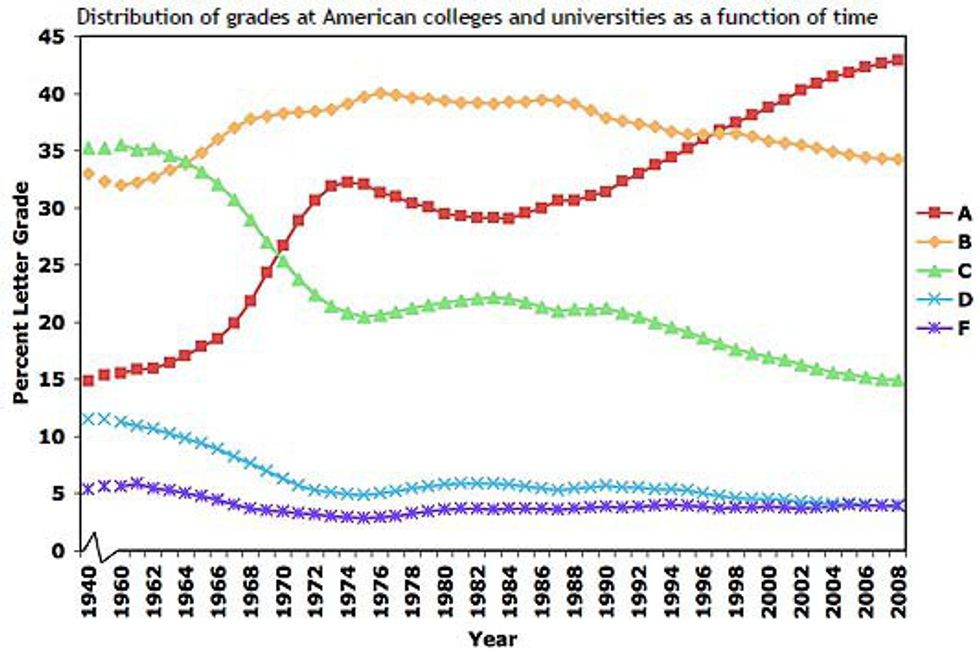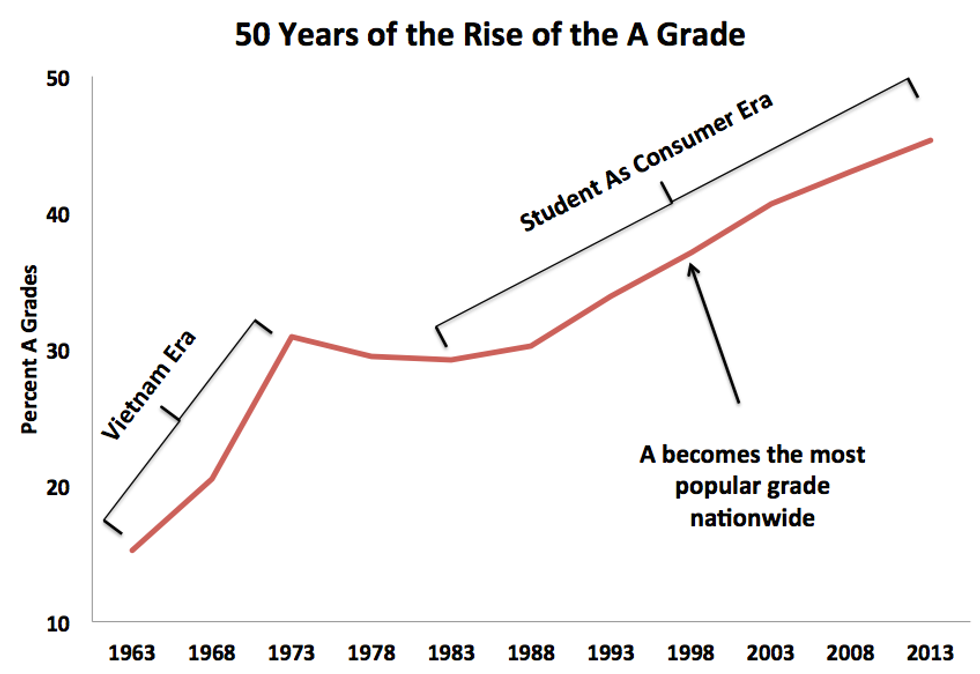I've heard time and time again the flabby college girl, with her monogrammed mug and tiny shorts, tell me that we are the most educated generation in America.
Don't blame me if I find it hard to believe. In fact, please tell me I'm not the only one who can't imagine how the millennial generation, with our Starbucks and spell-check-aided iPhones could possibly be more educated than that of say, Benjamin Franklin.
Of course, in the spirit of education, I've looked up several articles claiming that these college bimbos are indeed correct. Something besides boys must be in their heads, according to whitehouse.gov, who clearly states:
" Millennials also stand out because they are the most diverse and educated generation to date... About 61 percent of adult Millennials have attended college, whereas only 46 percent of the Baby Boomers did so."
But if we're the most educated generation because the majority of us goes to college, then shouldn't that mean college is as least as informative as it was during the Baby Boomer and Generation X era?
Let me explain my dilemma with an example. Do you remember all those textbooks and primary sources you plowed through your first year of college? Good. Now let's pretend your college years happened in the future, and you were class of 2050. Your education included J.K. Rowling, Homer and Faulkner. Now, let's also pretend that in 2051, all colleges across the world decided that they didn't like teaching math, J.K. Rowling, Homer and Faulkner (and all those other smart people) and decided instead to offer a curriculum of only second grade coloring books. This year collegiate levels spiked, and 70 percent of college-aged students attended college, unlike class of 2050 that was only 60 percent. Does that mean because more students attended college in 2051 they were more educated?
To answer that question applied to modern times, I crawled the Internet to find something comparing education levels of colleges throughout the years. It didn't take long for things to start smelling sour. Several articles tattooed the first page of Google, and spoke very academically about grade inflation.
One of the most informative articles was from TheWire, and it compared the number of grades distributed in colleges since the 1960s.
Here is one of the several graphs that make A students today blush just a little:
According to the national average, since the 1960s, there has been a significant growth in the number of A's distributed in the classroom. In '60s private and public schools, the number of A's given was less than 20 percent. In 2007, the number of A's distributed skyrocketed to around 50 percent in public institutions.
The Wire has an equally disturbing chart for American colleges. Here's a picture from the same article:
B's and A's have hugely increased in distribution since the 1940s.
Does this mean that curricula are getting easier, or instead are teachers just increasingly lenient?
One researcher, Stuart Rojstaczer, (who actually has a site devoted to grade inflation) divides grade inflation throughout the year into two points. The first he calls the "Vietnam Era" and the second, the "Student As a Consumer Era"--the latter in which 'A' becomes the most common grade nationwide.
He first names the most common suspect for grade inflation, the Vietnam War. More men went to college during this time to skip the draft. Many professors felt obligated to keep, in any way possible, as many men from flunking out and being to sent to Vietnam as they could.
Rojstaczer writes:
"In the Vietnam era, grades rose partly to keep male students from flunking out (and ending up being drafted into war). But the consumer era is different. It’s about helping students look good on paper, helping them to 'succeed.'"
Interestingly, he also claims that while many schools have recovered from grade inflation since the 1980s (the consumer era), colleges still tend to give out more A's than any other schools.
Does that mean the curricula became easier since the 1960s and 1980s?
For just as many millennials bash old ways of schooling, claiming our knowledge more superior than the generations before us, I heard just as many older folks cringe in horror at modern day education.
We hear things like, "I can't believe they don't have you read The Count of Monte Cristo in high school anymore!"
And:
"Wait, you don't know how to diagram sentences? I learned that in grade school!"
Others fuss about lack of memorization, the watering down of history, and the rarity of learning a classical instrument.
So just how has education changed over the years?
Here's a snippet I found of an eighth grade exam from the 1900s:
The questions on this eighth grade exam have several of the same things that would appear on one of my college exams.
(For the record, here is an eighth grade English exam from modern times).
Mental Floss, a highly respected brainy website filled with science facts and knowledge quizzes, documented in listicle format the ways that schools were different in the 1800s. During this time, 8th grade was the highest level of education in high school. Therefore, eighth graders had to know a lot more than they do now before they conquered the world.
During their school years, they learned under the Monitorial System, where older students taught and supervised the younger students. Older students were also supervised in the minutest detail by the teacher, who would listen carefully to their schoolwork, checking for pronunciation or factual errors.
While most high school graduates did not go to college, textbooks were much more difficult than they are now--just as hard as college primary sources, and with bigger words than any college textbook I've ever read. Here's an example of a seventh-grade textbook in the 1900s.
Just because more people went into the workforce instead of college in the 1800s and early 1900s, does not mean that these people were uneducated. Many were self educated like George Washington, who could not afford to go to school. It only takes a glance at the inventions over time to realize maybe we're not as smart as we think we are--at least, not more smarter than our predecessors.
And while there are certainly more educational opportunities than in Washington's time with almost as many people going to college than going to high school (see chart below) maybe that still doesn't mean we are more educated than our parents and grandparents because we're getting college diplomas. In fact, research suggests it is highly possible just school is stretched over a longer period of time (high school lasts until 12th grade, and everyone is expected to attend at least a two year college) and college is indeed much easier, as suggested by grade inflation.
I think I know what to do the next time the guy or girl who shops or plays video games all days claims we're smarter than the generations: I'll hand them an eighth grade textbook from the 1800s, exam included.


























